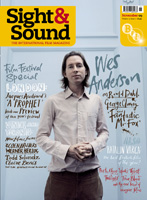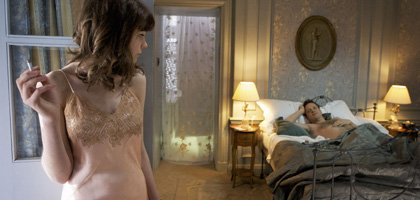Primary navigation


Nick Hornby's adaptation of journalist Lynn Barber's memoir of teenage seduction shows his trademark understated wit. But it's the nuanced touch of director Lone Scherfig that really makes it special, says Kate Stables
The getting of a sentimental education, as opposed to an academic one, has long obsessed film-makers (Truffaut picked at it like a scab), but it's been largely a boy's-eye view. Traditionally, even on the rare occasions when an infatuated schoolgirl has been at the centre of a British movie, she's been pregnant (A Taste of Honey) or disgraced, like Sarah Miles' teacher-wrecking fifth-former in Term of Trial. Rarely onscreen since The Prime of Miss Jean Brodie has a gymslipped brainbox weighed up the relative merits of illicit sex and Latin unseens. So one of the chief pleasures of Lone Scherfig's crisply confident and charmingly comic coming-of-age drama is in seeing a teenage girl kick against the pricks for a change - a girl who's hungry for adult life, too, rather than love or peer approval, those banal staples of the school-set movie since the 1980s.
Based on journalist Lynn Barber's sleek, barbed memoir of her own unwise sixth-form seduction, An Education is set in 1961, when there was still clear blue water between childhood and adult pleasures - a gap the film exploits to the full. Self-possessed 16-year-old Jenny is clearly as intrigued by debonair thirtyish wide-boy David's rule-breaking lifestyle as she is by his sports car, which glides her into an outwardly glamorous double life, half swot, half sophisticate. This may look like a romantic comedy, but Jenny's real romance is with the outside world.
Despite Scherfig's roots in the Danish Dogme movement, whose wobblycam aesthetic is miles from this polished period piece, she has a track record in creating this kind of textured and touching comedy, from the evening-class-misfits romance Italian for Beginners (2000) to the slyly morose Wilbur Wants to Kill Himself (2002). She's always been adept at plaiting harsh themes and light comedy without stifling either, and she's similarly deft in this film as Jenny and David's relationship becomes complicated by faint, discomfiting whiffs of duplicity. The directorial strength here isn't the fabled foreign film-maker's 'outsider's eye' on this very British piece, but a ubiquitous subtlety and warmth - the film is permeated by what the New York Times once called Scherfig's "exquisite sense of nuance".
She's particularly alert to the schizophrenia of Jenny's life during her affair with David - her constant slippage between child and adult modes. Watching Jenny transform from gawky teen to girl about town, Scherfig infuses the scenes with a kid's delight in the dressing-up box. Even the mise en scène cunningly modulates itself so that Jenny's expanded horizons are mimicked by barely perceptible visual shifts. The soupy, shut-in browns of schoolroom and cramped 'semi' slide imperceptibly into the sunny, bright delights of a stolen Parisian weekend or a smoky supper club. Period art direction isn't often as eloquent as it is here, representing 1961 (with accuracy) as a kind of 1950s overspill, all Utility furniture and cocktail dresses, while hinting at the candy-coloured 60s pleasures still to come.
This delicacy dovetails neatly with Nick Hornby's smart, sharp-eared scripting ("I wouldn't feel anything if my mother died. Does that make me an existentialist?"- "No, it makes you a cow"), which shows off his customary understated dialogue while glancing at contemporary issues of class and sexual politics. Hornby is beadily acute about the social mobility and concomitant status anxiety of the Macmillan years, crafting a succession of deliciously awkward sofa scenes where David's insouciant fabrications of a chaperoning aunt or an Oxford visit to C.S. Lewis spring Jenny from her parents' care. Class is a covert obsession for all the central characters, from David's fraudulent urbanity to Jenny's hunger for the carefree poshness of his friends Danny and Helen; and, most entertainingly, for Jenny's terminally insecure father, Jack. Aspiration is the essential motor of Alfred Molina's funny-sad performance as this naive, cardiganed martinet, hopelessly vulnerable to David's synthetic bonhomie and genial Goon impersonations.
Comic recreations of the 1960s often suffer from a galloping cultural nostalgia, whether sharp-edged like Sixty Six, or lazily soft-focused like The Boat That Rocked. But here, as Jenny's frolics with David darken and she stumbles into his sad, infantilised sexual games, Hornby keeps the movie clear-eyed about the trade-sex-for-supper, marry-a-good-man pre-feminist imperatives that gradually capsize Jenny's dual existence. This is a film fuelled by conversation in which important questions go unasked and flickers of moral unease are stubbed out like cigarettes (as when Jenny learns that David and Danny's theft of a valuable map must be dismissed as a caper). Thanks to Hornby and Scherfig's joint ability to signal rather than shout (except in the use of Paul Englishby's score, larded over key dramatic moments), a simple narrative acquires emotional heft and a significant amount of charm.
Indeed, the film is so delectable that it's easy to overlook quite how fatally charming it has rendered this spiky tale of betrayal. The film invokes a very English ironic understatement about the story's more unsettling elements: David's nymphophilia, fakery and thieving, Jack's dangerous naivety and eagerness to dash Jenny's academic hopes for a good match - all these become droll interludes. This unwillingness to name and shame (even David, the 'groomer' and potential bigamist, is tearfully contrite) leads to the film's one false step, a painful apology to Jenny from the abashed Jack which reeks anachronistically (and cosily) of 'closure'. The even-handedness that makes this adaptation a model of sophistication also loses something of the memoir's sheer enduring rage. Where Barber is caustic about the damage caused to her by all the adults involved, the film's sleek comic treatment has made its vivacious young heroine almost impregnable, a step that even smart-mouthed Juno shunned.
Key to this transformation is Carey Mulligan's uncannily self-assured performance as Jenny, blending wide-eyed enjoyment of her brave new world with an indomitably sharp wit. We may see her reduced to gobby bravado by Emma Thompson's withering headmistress, or choked with rage at David's duplicity, but somehow Jenny never feels significantly at risk. Peter Sarsgaard's seedy seducer is in many ways a more complex portrait: a man eager to rediscover life through his young lover's eyes, while gazing at her breasts. But his all-round amiability suggests that punches are being pulled, while his character's carefully crafted shades of grey are anyway significantly overshadowed by Mulligan's chirpy poise and pertness. Only Rosamund Pike's daffy, book-disparaging glamour-puss Helen - the woman who's convinced that "In about 50 years, nobody will speak Latin, probably. Not even Latin people" - can make her presence felt at anything like the same wattage.
Helen's hilarious anti-intellectualism points up the film's saving grace, however: atypically, it venerates education even as it teases laughs out of the blackboard boredom of adolescence. Too much Camus may have got Jenny into hot water (existentialism plays much the same role here as romantic fiction does in Madame Bovary), but it's the grind of solitary scholarship that ultimately propels her to Oxford, and into the world. An Education's lasting lesson is that a little learning may be a dangerous thing, but a lot of it can be a lifeline.